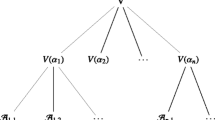Abstract
The distinction between the syntactic and the semantic approach to scientific theories emerged in formal philosophy of science. The semantic approach is commonly considered more advanced and more successful than the syntactic one, but the transition from the one approach to the other was not brought about without any loss. In essence, it is the formal analysis of atomic propositions and the analysis of deductive reasoning that dropped out of consideration in at least some of the elaborated versions of the semantic approach. In structuralist theory of science, as founded by Sneed and Stegmüller, the focus is on global propositions concerning the question of whether or not certain empirical systems satisfy a set-theoretic predicate that encodes the axioms of a scientific theory. Hence, an analysis of deductive reasoning from atomic premisses with the help of a given theory is missing. The objective of the present paper is to develop a deductive system on the basis of the structuralist framework. This system comes with a novel formulation of empirical propositions in structuralism.
Similar content being viewed by others
References
Andreas H.: A modal view of the semantics of theoretical sentences. Synthese 174(3), 367–383 (2010)
Andreas H.: New account of empirical claims in structuralism. Synthese 176(3), 311–332 (2010)
Andreas H.: A structuralist theory of belief revision. Journal of Logic, Language and Information 20, 205–232 (2011)
Balzer W., Moulines C.U., Sneed J.: An Architectonic for Science. The Structuralist Program. D. Reidel Publishing Company, Dordrecht (1987)
Barwise J.: Admissible Sets and Structures. Springer, Berlin (1975)
Carnap R.: Die Logische Syntax der Sprache. Springer, Wien (1934)
Carnap R.: Beobachtungssprache und theoretische Sprache. Dialectica 12, 236–248 (1958)
Carnap, R., Observational language and theoretical language, in J. Hintikka (ed.), Rudolf Carnap. Logical Empiricist, D. Reidel Publishing Company, Dordrecht, 1975, pp. 75–85.
Name N. 2009. Quine W. v. O., Mathematical Logic, Harvard University Press, Harvard, 1951.
Scheibe E.: A comparison of two recent views on theories. Theoretical Medicine and Bioethics 3(2), 233–253 (1982)
Scheibe E.: Die Reduktion physikalischer Theorien, Teil I, Grundlagen und elementare Theorie. Springer, Berlin (1997)
Sneed, J., The Logical Structure of Mathematical Physics, D. Reidel Publishing Company, Dordrecht, 1979. Second edition.
Suppes P.: Introduction to Logic. Von Nostrand, Princeton (1957)
Suppes P.: Models and Methods in the Philosophy of Science. Kluwer, Dordrecht (1993)
van Fraassen, B., The semantic approach to scientific theories, in N. J. Nersessian (ed.), The Process of Science, Kluwer Academic Publishers, Dordrecht, 1987, pp. 104–124.
Author information
Authors and Affiliations
Corresponding author
Rights and permissions
About this article
Cite this article
Andreas, H. Deductive Reasoning in the Structuralist Approach. Stud Logica 101, 1093–1113 (2013). https://doi.org/10.1007/s11225-012-9447-2
Received:
Published:
Issue Date:
DOI: https://doi.org/10.1007/s11225-012-9447-2




